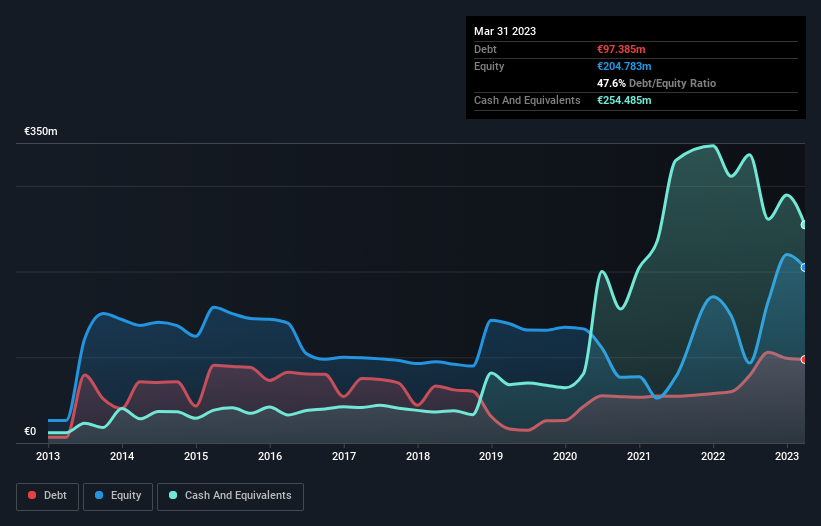David Iben put it well when he said, 'Volatility is not a risk we care about. What we care about is avoiding the permanent loss of capital.' So it might be obvious that you need to consider debt, when you think about how risky any given stock is, because too much debt can sink a company. As with many other companies Valneva SE (EPA:VLA) makes use of debt. But is this debt a concern to shareholders?
What Risk Does Debt Bring?
Debt and other liabilities become risky for a business when it cannot easily fulfill those obligations, either with free cash flow or by raising capital at an attractive price. If things get really bad, the lenders can take control of the business. However, a more usual (but still expensive) situation is where a company must dilute shareholders at a cheap share price simply to get debt under control. Of course, plenty of companies use debt to fund growth, without any negative consequences. The first step when considering a company's debt levels is to consider its cash and debt together.
View our latest analysis for Valneva
What Is Valneva's Net Debt?
The image below, which you can click on for greater detail, shows that at March 2023 Valneva had debt of €97.4m, up from €59.7m in one year. But it also has €254.5m in cash to offset that, meaning it has €157.1m net cash.

How Healthy Is Valneva's Balance Sheet?
According to the last reported balance sheet, Valneva had liabilities of €263.3m due within 12 months, and liabilities of €122.0m due beyond 12 months. Offsetting this, it had €254.5m in cash and €27.0m in receivables that were due within 12 months. So it has liabilities totalling €103.7m more than its cash and near-term receivables, combined.
Given Valneva has a market capitalization of €952.1m, it's hard to believe these liabilities pose much threat. Having said that, it's clear that we should continue to monitor its balance sheet, lest it change for the worse. Despite its noteworthy liabilities, Valneva boasts net cash, so it's fair to say it does not have a heavy debt load! There's no doubt that we learn most about debt from the balance sheet. But it is future earnings, more than anything, that will determine Valneva's ability to maintain a healthy balance sheet going forward. So if you want to see what the professionals think, you might find this free report on analyst profit forecasts to be interesting.
In the last year Valneva wasn't profitable at an EBIT level, but managed to grow its revenue by 7.6%, to €373m. That rate of growth is a bit slow for our taste, but it takes all types to make a world.
So How Risky Is Valneva?
We have no doubt that loss making companies are, in general, riskier than profitable ones. And in the last year Valneva had an earnings before interest and tax (EBIT) loss, truth be told. Indeed, in that time it burnt through €266m of cash and made a loss of €135m. But the saving grace is the €157.1m on the balance sheet. That kitty means the company can keep spending for growth for at least two years, at current rates. Summing up, we're a little skeptical of this one, as it seems fairly risky in the absence of free cashflow. The balance sheet is clearly the area to focus on when you are analysing debt. However, not all investment risk resides within the balance sheet - far from it. For example, we've discovered 2 warning signs for Valneva that you should be aware of before investing here.
If you're interested in investing in businesses that can grow profits without the burden of debt, then check out this free list of growing businesses that have net cash on the balance sheet.
New: Manage All Your Stock Portfolios in One Place
We've created the ultimate portfolio companion for stock investors, and it's free.
• Connect an unlimited number of Portfolios and see your total in one currency
• Be alerted to new Warning Signs or Risks via email or mobile
• Track the Fair Value of your stocks
Have feedback on this article? Concerned about the content? Get in touch with us directly. Alternatively, email editorial-team (at) simplywallst.com.
This article by Simply Wall St is general in nature. We provide commentary based on historical data and analyst forecasts only using an unbiased methodology and our articles are not intended to be financial advice. It does not constitute a recommendation to buy or sell any stock, and does not take account of your objectives, or your financial situation. We aim to bring you long-term focused analysis driven by fundamental data. Note that our analysis may not factor in the latest price-sensitive company announcements or qualitative material. Simply Wall St has no position in any stocks mentioned.
About ENXTPA:VLA
Valneva
A specialty vaccine company, develops, manufactures, and commercializes prophylactic vaccines for infectious diseases with unmet needs.
High growth potential and good value.
Similar Companies
Market Insights
Community Narratives



